INFPs and Their Compatibility with Every Myers-Briggs® Personality Type
How compatible are INFPs with the other personality types in the Myers-Briggs® system? Let’s take a look!
Not sure what your personality type is? Take our new personality questionnaire here. Or you can take the official MBTI® here.
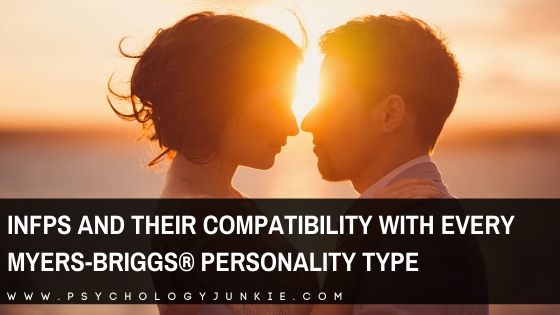
This article contains affiliate links. If you purchase an eBook from one of my links I get a small percentage back to help run my site.
INFP Compatibility with Every Myers-Briggs® Personality Type
INFPs and ENFPs
Dreams and imagination abound in this passionate pairing. ENFPs and INFPs share many things in common, but there are enough differences that there’s a sense of balance in this relationship. Both types are idealistic, passionate, and guided by their deeply-held inner values. Yet while ENFPs are propelled primarily by their sense of the potential, INFPs are propelled primarily by what they believe is right for them. INFPs will have a sense of how they feel about something relatively quickly, and ENFPs will have a sense of something’s potential very quickly. INFPs can help ENFPs to slow down and align themselves with their values and personal feelings. ENFPs can help INFPs to explore more possibilities and dabble in new, creative experiences. Both yearn for personal growth and both types will readily understand the other’s creative process. That said, because these types are so subjective in their values and goals, there can be huge differences between them. One INFP might be passionate in defense of animal rights while another is eating a strictly Keto diet. Some NFP couples can descend into fiery conflicts when their values are misaligned because those values are so personal and important to them.
INFPs and ENTPs
An explosion of ideas and imagination bubble over in this spirited relationship. INFPs bring warmth, idealism, and depth, while ENTPs bring energy, precision, and charisma. Both connect over ideas, exploration, and a wonder over the unknown and the possible. However, they can conflict over their Thinking/Feeling differences. INFPs look to their values and moral code when a decision presents itself, and can immediately hold very firm views on something because of how it aligns with those values. ENTPs, in contrast, look first to their logical principles, the facts, and weigh the various pros and cons. ENTPs may think that INFPs come to conclusions too quickly, or are too biased based on their personal feelings. INFPs, in turn, can feel like ENTPs are too impersonal and detached when they make decisions. They often feel confused when ENTPs focus on weighing the raw data before assessing how they personally feel about something. If ENTPs can learn more about Introverted Feeling, and INFPs can learn more about Introverted Thinking, they can try to value each other’s perspectives rather than shutting them down.
INFPs and INFPs
Depth and passion are the hallmarks of this like-meets-like pairing. INFPs and INFPs are often drawn to each other for their empathy, imagination, and sincerity. Both are drawn to creative pursuits and innovation. Both will fight for their values and personal freedoms above all else. However, the very things that draw them to each other can also cause problems later in the relationship. INFPs are so individualistic and tied to their beliefs and ethics that they can get into fiery arguments about what is “right,” or “wrong.” They may also become warped, strengthening their already-strong functions (Introverted Feeling and Extraverted Intuition), while enabling each other in their weaknesses. It may be hard for them to get their projects prioritized, organized, and finished on time. They may lose track of day-to-day details, like paying the bills, running errands, or doing laundry, only to resent each other when these blind spots catch up to them. This is especially true when one INFP takes on the bulk of the mundane responsibilities, even though they’d prefer not to. It’s essential for these pairs to fairly divide chores and responsibilities so resentment doesn’t build up over time.
INFPs and INTPs
This warm, comfortable relationship is filled with mutual compassion and support. Both of these types are driven by a quest for personal growth and freedom. Both enjoy pondering the deeper meaning behind things. Concepts and imagination drive them, and they enjoy discussing their original ideas with each other late into the evenings. INFPs are drawn to the independence, curiosity, and intellectual confidence of the INTP. INTPs are drawn to the creativity, warmth, and compassion of the INFP. Both types are individualistic and willing to go “down with the ship” for their values or principles. However, conflicts can erupt in this relationship when communication differences collide. INFPs are intensely sensitive and make decisions based on their personal values. INTPs try to stay detached and objective in their decisions, worrying that their personal feelings would get in the way of being reasonable. INFPs want a lot of empathy and emotional support and might feel like INTPs are distant or hard-to-read. INTPs want to be able to give criticism and voice arguments without having to worry about other people’s feelings. They can get exasperated when they unintentionally offend the INFP with their more impersonal, detached nature. If INTPs can accept that INFPs are driven by an innate sense of what’s right or wrong, and INFPs can accept that INTPs are driven more by accuracy and logic than subjective values then both types can avoid many conflicts.
INFPs and ENFJs
Passion and vision are at the heart of this relationship. In the INFP, the ENFJ finds someone who challenges them to look inwards and discover what’s deeply important to them. In the ENFJ, the INFP finds someone who challenges them to pursue their dreams, express themselves, and get out more. Both types are emotionally warm, supportive, and empathetic. Both will try as hard as they can to make space for the other to express their heart and be authentic. Both tend to find the other type inspirational and motivating. That said, like any relationship, this one is bound to have some conflicts. When INFPs make decisions they look inwards first, whereas ENFJs tend to look outwards. INFPs think, “What is important to me?” and ENFJs think, “What is important for the group?” INFPs are highly individualistic, while ENFJs are social chameleons, easily blending in anywhere. INFPs can interpret the ENFJs ways as being “people-pleasing,” while ENFJs can interpret the INFPs more subjective outlook at “selfish.” Both need to be careful not to become self-righteous and moralizing with each other, something that Feeling-dominant types can struggle with. This article can help both types to understand their different feeling processes: Are You an Introverted Feeler or an Extraverted Feeler?
INFPs and ENTJs
Opposites attract, and this is certainly the case in this intense pairing. Both of these types enjoy exploring concepts, ideas, and possibilities. Both types focus on the future more than the present. However, where INFPs are the consummate idealists, driven by their values, ENTJs are strategists, mobilizing people to achieve objectives. INFPs are flexible and live to explore, whereas ENTJs are decisive and driven to accomplish. Both can wind up getting frustrated with each other’s different ways of approaching life. INFPs might feel like ENTJs are too brusque, bossy, or fixated on work. ENTJs might feel like INFPs are too dreamy, unfocused, and sensitive. They can both get condescending with each other, with INFPs taking the moral high ground, and ENTJs becoming domineering and critical. Fiery arguments can lead to bitter break-ups if neither type is willing to acknowledge the gifts of the other. Both types need to try to learn from each other while not devaluing their own strengths. Learning about personality type can help these types to see the unique gifts that the other has.
INFPs and INFJs
Depth and imagination run wild in this powerful relationship. While these types share none of the same cognitive functions, they share many of the same values. Both thrive in quiet atmospheres and enjoy focusing on imagination and possibility more than surface-level details. INFPs can help INFJs to deep-dive into their feelings and find out what really matters to them on a subjective level. INFJs can help INFPs to find a direction for all their creative energy. Problems erupt in this relationship when INFJs see INFPs as too caught up in their own feelings or too hard to read, and INFPs feel that INFJs are inauthentic or people-pleasers. By developing an understanding of each other’s cognitive functions, the two can have a much more understanding relationship.
INFPs and INTJs
Vision and depth are at the heart of this intense relationship. Both of these types respect each other’s need for space, and both enjoy exploring ideas, concepts, and possibilities. INTJs can help INFPs find a strategy and focus for their ideas, and INFPs help INTJs to tap into their inner passions, ideals, and desires. There’s a strong intellectual connection between these two and a deep, shared curiosity about ideas and the potential of everything around them. Conflicts can arise in this relationship when both types disagree on decisions. INTJs try to approach decisions impersonally and objectively, whereas INFPs try to approach decisions personally and empathically. INTJs can seem confusing and overly-reserved to INFPs, and INFPs can seem overly-sensitive to INTJs. However, both of these types tend to discuss their feelings calmly. One of the biggest struggles in this relationship is with lifestyle preferences. INTJs like a plan, a sense of closure, and a clear, singular sense of direction. INFPs like a flexible lifestyle, and they have a more leisurely approach to life. They like being ready to explore, and INTJs like being ready to achieve. INTJs need a lot of closure in their decisions, and they prefer an environment that is neat and organized. They might get into arguments about who does certain chores or handles certain responsibilities. It can feel to INFPs like INTJs are too uptight, and INTJs can feel like INFPs are too directionless. It’s important for each type to respect the other’s need for a Perceiving or Judging outlook in life. It’s also important for each type to take the other’s outlook and comfort into account when making decisions.
INFPs and ESFPs
A sense of fun and possibility are the hallmarks of this amorous relationship. ESFPs help to break INFPs out of their shell and get in touch with the physical world around them. They show them new sights, sounds, tastes, and encounters that both excite them and furnish their imagination with new experiences. INFPs help ESFPs to look inward and explore their deeper values, feelings, and passions. They help enliven the ESFP’s imagination and show them a glimmering sense of possibility in the future. Both types enjoy a flexible, laid-back approach to life, and both types consult their feelings and values when making decisions. The most frequent area of conflict in this relationship stems from the Extroversion/Introversion difference. ESFPs like a lot of engagement, variety, and action. INFPs need more quiet, peace, and time alone. If ESFPs push INFPs to socialize beyond their comfort level, then the INFP can feel exhausted and drained. In the same way, if the INFP pushes the ESFP to be quieter and more “introverted” than they are comfortable with, the ESFP can feel drained and bored. It’s important for both partners to recognize the energy needs of the other. Both will need some time away from each other to pursue their own interests – and that’s okay. If both types can respect this, there are huge opportunities for love and growth in this relationship.
INFPs and ESTPs
If you like a challenge and you want to enlighten your mind with new perspectives, then this relationship is perfect for you. INFPs are drawn to the cool charm and energetic nature of the ESTP; ESTPs are drawn to the sincerity and warmth of the INFP. Both partners enjoy a leisurely, flexible approach to life, but the similarities tend to stop there. ESTPs are the ultimate adventurers, focusing on any exciting experience or opportunity that might present itself. Impulsive, playful, and resourceful, they like to stay busy and take life one moment at a time. INFPs are driven by their deeply personal values and are gentle, reserved, and deeply committed to the causes they care about. To the INFP, the ESTP can seem hedonistic, unpredictable, and detached. To the ESTP, the INFP can seem overly-sensitive, mysterious, and confusing. Both have completely different cognitive functions, so they can have a very hard time understanding what’s going on in each other’s minds. Because of this, they can have bitter misunderstandings and frustrations. If both are truly committed, taking the time to understand each other’s personality types can be a game-changer in the happiness of the relationship.
INFPs and ISFPs
Passionate and idealistic, these two types share enough similarities to create a sense of kinship, but enough differences to keep things interesting. Where INFPs are imaginative and focused primarily on abstract possibilities, ISFPs are realists who are focused on experiencing life to the fullest. INFPs are the “idea people,” and ISFPs are the pragmatists, which often creates a harmonious balance. Both of these types tend to understand each other’s way of making decisions because they both value Introverted Feeling. They are both individualistic, committed to their causes, and focused on living in alignment with their values. This can be a good and bad thing. While they might feel a sense of innate understanding with each other, they can also take very different stances on subjects. They can have very different values and are likely to think that their perspective is the morally superior one. This can lead to heated arguments and rivalries if both are unwilling to see the other side’s perspective. Calm, honest communication and open-mindedness are essential in keeping this relationship strong.
INFPs and ISTPs
These two partners are initially drawn to each other because of their differences. In the ISTP, the INFP sees someone who has their feet firmly planted on the ground. ISTPs are realistic, independent, and skillful and capable with things in the physical world. In the INFP, the ISTP sees someone who opens their mind to new possibilities and passions. They sense that the world will seem larger and grander with the INFP. Both types will respect each other’s need for space, and both have a leisurely, flexible approach to life. However, there are some differences in this relationship that can cause tension over time. These types share none of the same cognitive functions, so it can be hard for them to innately understand each other. INFPs make decisions by analyzing how the options line up with their personal values and feelings, whereas ISTPs make decisions by detaching and weighing the pros and cons and logic of the various options. INFPs are drawn to theories and abstractions, whereas ISTPs can get bored of such things. They may find themselves running out of things to talk about because their interests lie in different realms. Compromise, patience, and understanding will keep this relationship strong. In mid-life the differences between these two types become less stark, as ISTPs start to develop Intuition more fully, and INFPs develop their Sensing side more fully.
INFPs and ESFJs
Passion, warmth, and mutual support are hallmarks of this relationship. In the ESFJ, the INFP finds someone who is grounded, helpful, and conscientious. In the INFP, the ESFJ finds a partner who is intense, imaginative, and compassionate. ESFJs innately sense the physical comforts and routines that make INFPs happy, and INFPs enjoy enlightening the ESFJ with ideas, quirky humor, and theories. ESFJs find the INFP’s perspectives intriguing and eye-opening. INFPs find the ESFJ’s perspectives comforting and refreshingly practical. That said, this relationship isn’t conflict-free. ESFJs approach decisions from the standpoint of Extraverted Feeling. They try to take group needs into account and are concerned with getting everyone’s needs met. INFPs are more individualistic and are most concerned with living in accordance with their subjective values. This can lead to misunderstandings and arguments when both types can’t see eye-to-eye. ESFJs might feel like INFPs are being self-absorbed, and INFPs might feel like ESFJs are being overly-focused on making everyone happy. INFPs should learn about Extraverted Feeling, and ESFJs should learn about Introverted Feeling, so that conflicts can be avoided.
INFPs and ESTJs
This relationship may seem challenging at times, but it’s one of the most ideal relationships for people who seek personal growth. INFPs and ESTJs have all the same cognitive functions, but in reverse order. INFPs are strong in areas where ESTJs are weak, and vice versa. There’s a sense of mutual understanding between these two types because of the fact that they are working with the same mental hardware. But they also sense that the other partner can enrich their understanding of the world. With the ESTJ, the INFP can bring their ideas and dreams into fruition with actionable, logical plans. With the INFP, the ESTJ can get in touch with their deeper values, feelings, and drives in life. It’s important for these couples to watch out for condescension. INFPs and ESTJs are both at risk of devaluing the other’s natural strengths. INFPs might feel like ESTJs are too brusque, impersonal, and detached from their feelings. ESTJs might feel like INFPs are too sensitive, indecisive, and wrapped up in their own little world. In order to avoid condescension, it’s important for both partners to look at what they can learn from each other rather than think of ways they are superior to their partner. You can find out much more about this relationship pairing in my article: When Opposites Attract – INFPs and Compatibility with ESTJs and ENTJs
INFPs and ISFJs
Romantic and comforting, this is one of the most successful relationship pairings I’ve seen. ISFJs help INFPs to take care of themselves and find stability in a world that often feels chaotic. They give security, emotional support, and a grounded sense of home. INFPs help ISFJs to explore their intuition and see the big picture. Together, they can be an unbreakable couple – undying in their loyalty, affection, and support for each other. That said, this relationship isn’t completely problem-free. ISFJs and INFPs have different decision-making functions. INFPs prioritize their inner values and their emotional integrity. They look inside first, before looking outside. ISFJs prioritize group values and emotional openness. ISFJs want to make a decision that will get everyone’s needs met and provide a sense of consensus. INFPs want to make a decision that will line up with their values and desires. It’s less important to the INFP that everyone is happy with the decision then knowing they’ve followed their heart. Together, they can wind up arguing over which outcome is the best. INFPs might think that ISFJs are too focused on “people-pleasing,” and ISFJs might think that INFPs are being selfish. Understanding that this can be a problem can help to de-escalate conflicts in some ways. When both types reach an impasse, they should slow down and look at the pros and cons of each person’s perspective, without automatically assuming their own perspective is the morally righteous one. Many times, a blend of both their perspectives can be the best choice.
INFPs and ISTJs
These two might seem very different at first glance, but they actually share a great deal in common. Both types value quiet reflection, and both crave a life that is in alignment with their deeply personal values. INFPs and ISTJs share all of the same cognitive functions, just in a slightly different order. Because of this, they can help to strengthen each other’s weaknesses. INFPs can help ISTJs tap into their deeper feelings and dreams, and ISTJs can help INFPs to become more grounded and pragmatic. They both admire the strengths of the other and are eager to learn from each other. That said, conflicts can arise when their lifestyle preferences clash. INFPs are flexible and leisurely, whereas ISTJs like everything planned out and structured. INFPs tend to lose track of mundane details like daily chores and paying bills on time. ISTJs can de-prioritize brainstorming and innovating, preferring to stick with what they know. ISTJs may take on the bulk of the household chores, only to resent the INFP later. The INFP might feel pressured to change their natural preferences for the comfort of the ISTJ. It’s important for this couple to split up household duties fairly so that resentment doesn’t fester. It’s also important for both types to find beauty in their differences.
What Are Your Thoughts?
Find out more about your personality type in our eBooks, Discovering You: Unlocking the Power of Personality Type, The INFJ – Understanding the Mystic, and The INFP – Understanding the Dreamer. You can also connect with me via Facebook, Instagram, or Twitter!
Subscribe to Our Newsletter

Want to discover more about personality type? Get the inside scoop with Susan Storm on all things typological, along with special subscriber freebies, and discounts on new eBooks and courses! Join our newsletter today!


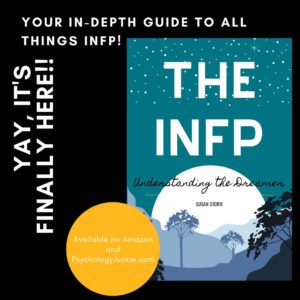

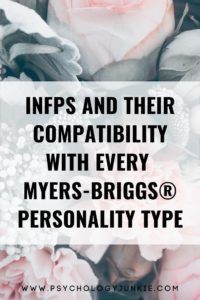
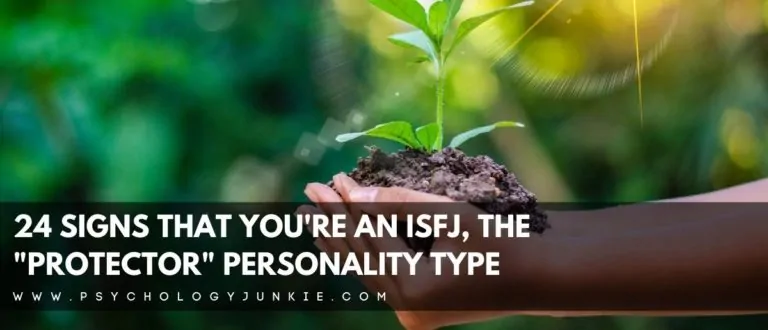
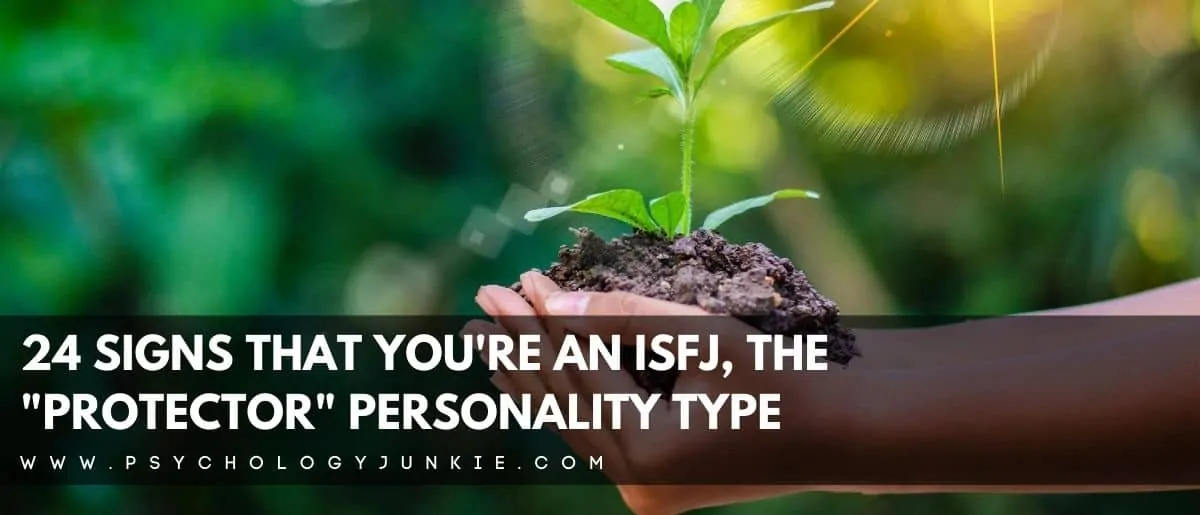








I love how on-point this list is, even when I think of my non-romantic relationships. Well done with this article, Susan! I’ve always wondered about my ‘compatibility’ with my husband according to the MBTI. And now I know, and it all makes sense.
This is one of the rare instances where I find myself in disagreement with the core of what’s being conveyed.
Basically all paragraphs have a “you have a lot in common” + “relationships between you may very well work and be fruitful” core.
I think that differences in the second and fourth type letter (S/N, P/J) are next to unabridgeable.
And I think that some pairings are better not even attempted.
Let’s take INFP/INTP with ISFJ. In other words, my stormy, ill-ended marriage. It’s true there can be great attraction. But can there be real harmony, stress on real? The ISFJ will make it appear so. The INFP/INTP will believe, and also want to believe, the appearances. But reality won”t go away.
While Ti/Fi can co-operate with Te/Fe in a work environment of any sort, a love relationship between them is something I wouldn’t suggest.
Or take the INFP-ENTJ pair. The description given is masterful. Indeed, we are each other’s shadow, like mirrored images. So, akin to each other… like something, and itself inverted. But does this mean there can be real harmony, to the degree needed in a love relationship? I seriously doubt it. My experiences tell me that I and ENTJs (also INTJs) are like the perfect reagents to put together to get an explosion (less boisterous with INTJs).